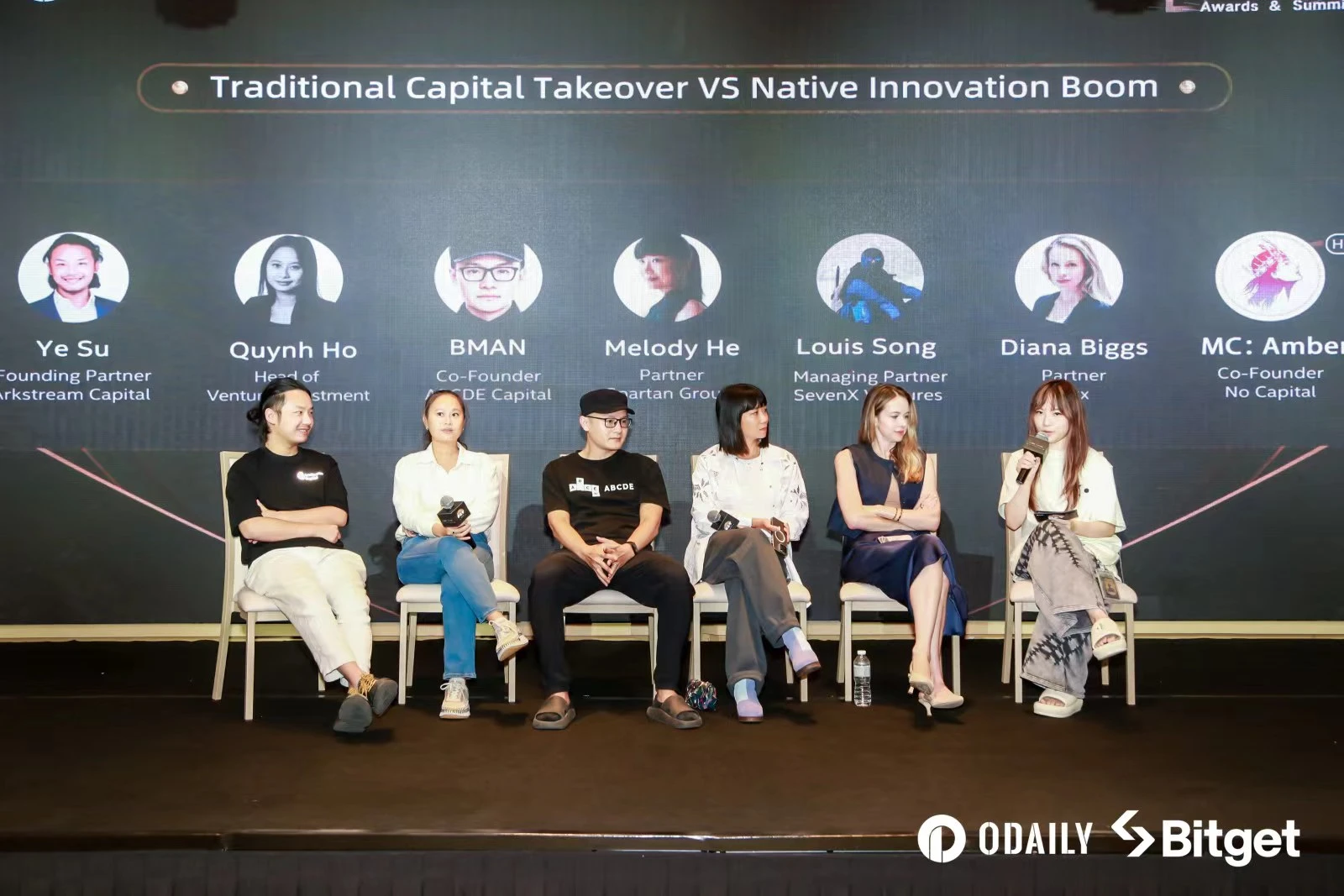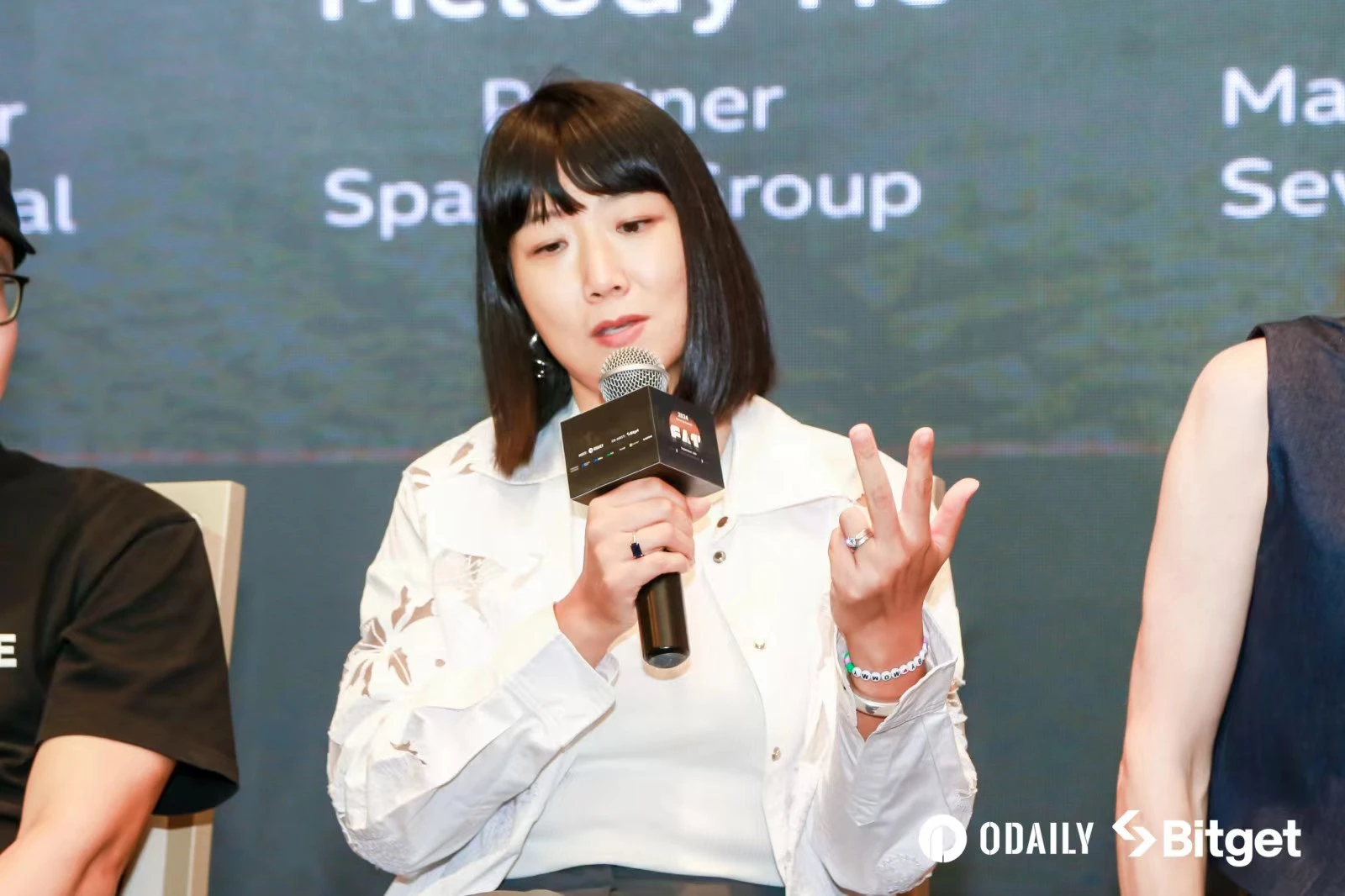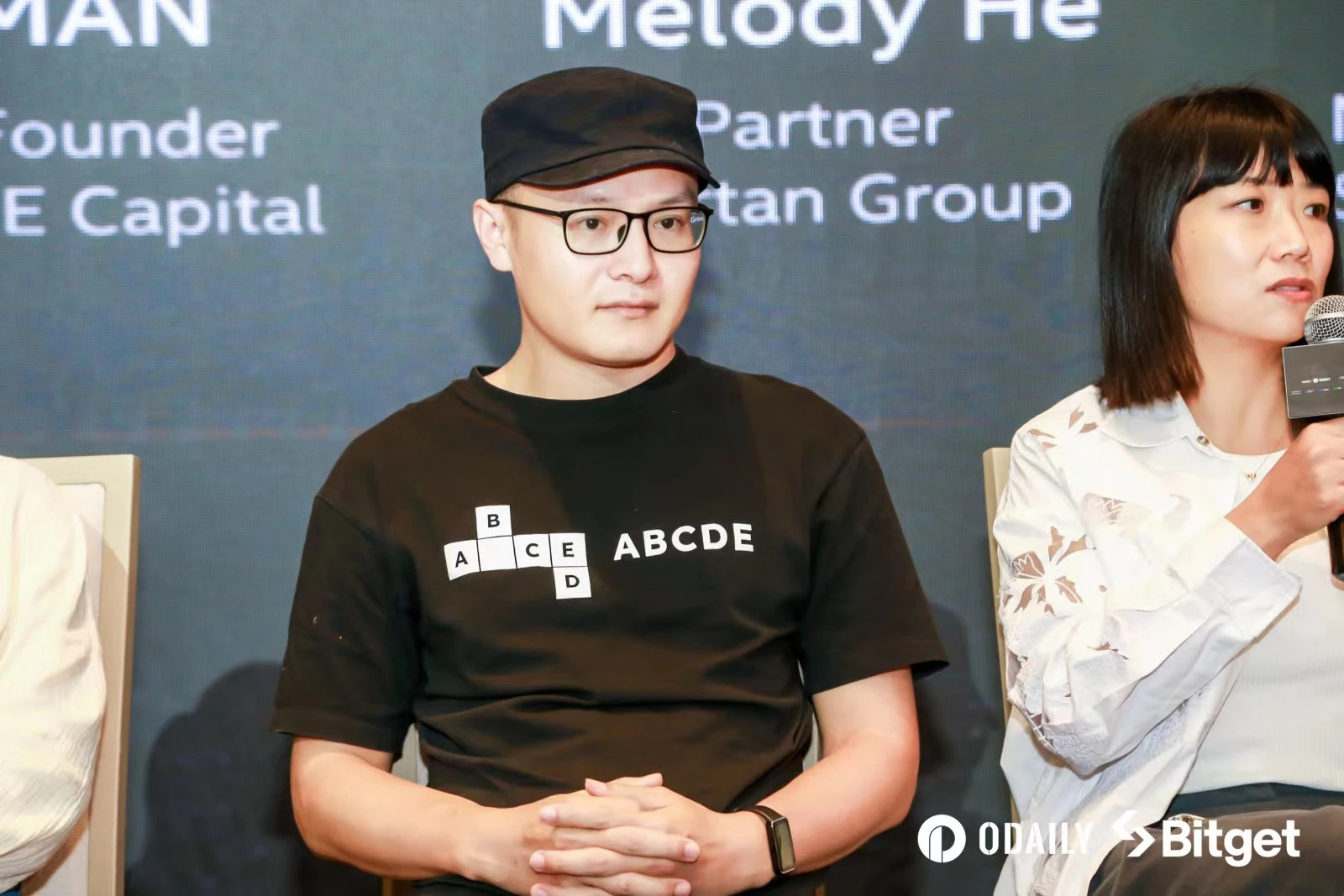
On September 16, at the annual FAT Awards 2024 hosted by Odaily Planet Daily and co-hosted by Bitget, heads of many well-known institutions presented a wonderful discussion at the roundtable meeting on the theme of Traditional Capital Takeover vs Native Innovation Boom. The roundtable meeting was hosted by Amber, co-founder of No Capital, and the guests included Melody He, partner of Spartan Group, BMAN, co-founder of ABCDE Capital, Quynh Ho, head of venture capital at GSR, Ye Su, founding partner of Arkstream Capital, and Diana Biggs, partner of 1kx.
The following is the transcript of the roundtable meeting, compiled and translated by Odaily Planet Daily.
Amber : Hello everyone, I am Amber, co-founder of No Capital. I am very happy to host this roundtable. First of all, please introduce yourselves?

Melody : Hello everyone, I am Melody He, a partner of Spartan Group. Spartan Group was established in 2018 and is involved in investment banking business.
BMAN : Hello everyone, I am BMAN, co-founder of ABCDE Capital. ABCDE Capital has been in the crypto field for 11 years and has many businesses in trading, venture capital and SaaS.
Quynh : Hello everyone, I am Quynh Ho, Head of Venture Capital at GSR. The venture capital business started in 2019 and we have been focusing on cryptocurrency and finance so far.
Ye Su: Hello everyone, I am Ye Su, the founding partner of Arkstream Capital. We manage more than 100 portfolios and the number is growing, with a special focus on Bitcoin infrastructure.
Diana : Hello everyone, I am Diana Biggs, partner of 1kx, and I am very happy to participate in this roundtable.
Amber : Most of the tokens in the market are very weak. What do you think is the reason behind this and what are the next opportunities?
Diana: ETFs can cover any market. I was the CEO of Valor, which trades exchange-traded products, and these investors usually seek the convenience of using traditional stock exchanges or for compliance needs. In the EU, there have been cryptocurrency ETPs since 2018, but it has not really attracted a large number of users and has been more of a service for existing users. I think that over time, it will only promote further development of the market.
We have had these products in the EU for quite some time and as a regulator a lot of money has been invested in user education which will help increase user comfort in financial services. People in the crypto space may not have anticipated the huge impact and there may be more changes to come.

BMAN: This is a major milestone for Bitcoin. Physical ETFs have a long history, and when you have a gold ETF, a lot of gold derivatives come out of it. I think Bitcoin will spawn a lot of derivatives, especially in the traditional financial sector, those who are used to holding Bitcoin ETF assets.
Ye Su: I echo BMANs view on gold ETFs. After the launch of gold ETFs in 2004, its market value reached 10 trillion US dollars in 7 years. We dont know how Bitcoin will rise and fall in the next two years, but I think the prospects in this area will be better.
Quynh : I want to comment on the Web3 venture capital market. Its hard to directly compare one market to another, for example, investment in Web3 projects is typically around $5 million, but it may have reached about $17 million. I also want to point out that this is just the beginning - most of the innovation is still focused on layer 1 and layer 2 protocols. When we start to develop super applications, such as Polymarket having 5 million open contracts per day, it is definitely a sign of strong interest in this space. Solana also has a lot of projects that have received funding, so I believe it wont be long before we see more changes.

Amber : Another phenomenon is, will the calmness at the top of the market affect the decision-making of institutions?
Melody: I think the whole world, not just crypto, is experiencing the effects of COVID-19 - severe inflation, which has been driven by Chinas growth, the war in Turkey, South America, etc. in the past 15 years. Economic growth has been weak in the past 02 years, and it has been a period of speculation. So, I think the reality is that it will take us longer to adapt to these changes, not just in the crypto space, but also for traditional investors and technology to adapt to the actual value proposition and user behavior. I dont think this is a bad thing, in fact, its a good thing that we can get back to basics. Overall, this is not a bad time for us, you can still get a reasonable valuation. Expectations have become lower than in the past.

Ye Su: The overall market growth experience is similar. You may have felt this change in 2019, and everyone expected that there would be less cryptocurrency in the retail market. In my time, the market has undergone similar changes many times - the good thing is that there is an ample supply of cryptocurrency. In the interest rate cycle of 2018, we saw a 40% increase in the valuation of global leveraged capital. As this trend continues, all RFPs (requests for proposals) are looking for more deal opportunities.

Amber: Currently, the most popular fields are cryptocurrency and artificial intelligence, and many institutions are studying the development direction of these two fields. Can you talk about your views on this phenomenon?
Quynh: The combination of cryptocurrencies and AI is exciting, especially in terms of using cryptocurrencies to verify the identity and data of AI creations. How do you distinguish between bots and human creations? It is also interesting to use AI to customize AI agents, for example in gaming applications, where this technology can enhance the players gaming experience and also train the AI, which is very promising. However, combining crypto with AI requires a certain technical threshold. Remember that 500,000 tokens were created in a few months, which shows that the entry barrier is very low, so crypto is a long-term asset class, while other projects may bring returns in a short period of time.
Diana: I think this is a very interesting phenomenon because it allows us to see the cultural impact, which is exactly what we can contribute through culture.
BMAN: Back in 2015, I had been working in the field of AI for 5 years. At that time, AI technology was not very mature, but we were very enthusiastic about cryptocurrency and AI. I thought banks would not open accounts for AI, but today AI has made a lot of money, and 90% of daily active users (DAU) are not humans, but robots and AI.
I think that in the future, 99% of transactions and interactions will be done by AI and robots, and about 99% of transactions will be conducted by robots. Many friends are discussing whether we should give AI human rights, identity accounts, and make it an independent entity. I think blockchain is a great way to introduce AI because blockchain provides an ecosystem and economic foundation for AI. I believe that in the future, blockchain will be run by AI.

Ye Su: I am skeptical about the MEME token. I think the magic is that it creates a permissioned market that allows the issuance of an asset class. So how do we define it? To me, the meme token represents a pricing model for a political movement. There are people who believe in it, and this creates a sustained movement. I think this is the first time that a virtual movement has been combined with an asset class, and it has liquidity. Although these assets are internally backed, we only trade them based on the market.










